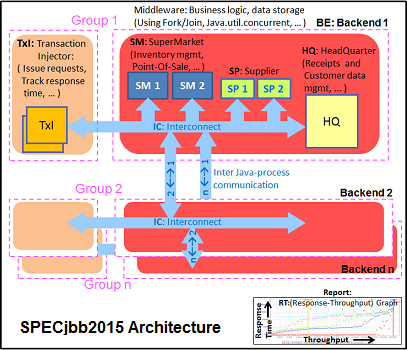Sizing Up Servers: Intel's Skylake-SP Xeon versus AMD's EPYC 7000 - The Server CPU Battle of the Decade?
by Johan De Gelas & Ian Cutress on July 11, 2017 12:15 PM EST- Posted in
- CPUs
- AMD
- Intel
- Xeon
- Enterprise
- Skylake
- Zen
- Naples
- Skylake-SP
- EPYC
Java Performance
The SPECjbb 2015 benchmark has "a usage model based on a world-wide supermarket company with an IT infrastructure that handles a mix of point-of-sale requests, online purchases, and data-mining operations." It uses the latest Java 7 features and makes use of XML, compressed communication, and messaging with security.
We tested SPECjbb with four groups of transaction injectors and backends. The reason why we use the "Multi JVM" test is that it is more realistic: multiple VMs on a server is a very common practice.
The Java version was OpenJDK 1.8.0_131. We applied relatively basic tuning to mimic real-world use, while aiming to fit everything inside a server with 128 GB of RAM:
The graph below shows the maximum throughput numbers for our MultiJVM SPECJbb test.

Even though our testing is not the ideal case for AMD (you would probably choose 8 or even 16 back-ends), the EPYC edges out the Xeon 8176. Using 8 JVMs increases the gap from 1% to 4-5%.
The Critical-jOPS metric is a throughput metric under response time constraint.

With this number of threads active, you can get much higher Critical-jOps by significantly increasing the RAM per JVM. However, we did not want that as this would mean we can not compare with systems that can only accommodate 128 GB of RAM.











219 Comments
View All Comments
JKflipflop98 - Wednesday, July 12, 2017 - link
For years I thought you were just really committed to playing the "dumb AMD fanbot" schtick for laughs. It's infinitely more funny now that I know you've actually been *serious* this entire time.ddriver - Wednesday, July 12, 2017 - link
Whatever helps you feel better about yourself ;) I bet it is funny now, that AT have to carefully devise intel biased benches and lie in its reviews in hopes intel at least saves face. BTW I don't have a single amd CPU running ATM.WinterCharm - Thursday, July 13, 2017 - link
Uh, what are you smoking? this is a pretty even piece.boozed - Tuesday, July 11, 2017 - link
You haven't done your job properly unless you've annoyed the fanboys (and perhaps even fangirls) for both sides!JohanAnandtech - Wednesday, July 12, 2017 - link
Wise words. Indeed :-)Ranger1065 - Wednesday, July 12, 2017 - link
If you are referring to ddriver, I agree, wise words indeed.ddriver - Wednesday, July 12, 2017 - link
Well, that assumption rests on the presumption that the point of reviews is to upsed fanboys.I'd say that a "review done right" would include different workload scenarios, there is nothing wrong with having one that will show the benefits of intel's approach to doing server chips, but that should be properly denoted, and should be just one of several database tests and should be accompanied by gigabytes of databases which is what we use in real world scenarios.
CoachAub - Wednesday, July 12, 2017 - link
It was mentioned more than once that this review was rushed to make a deadline and that the suite of benchmarks were not everything they wanted to run and without optimizations or even the usual tweaks an end-user would make to their system. So, keep that in mind as you argue over the tests and different scenarios, etc.ddriver - Thursday, July 13, 2017 - link
It doesn't take a lot of time to populate a larger database so that you can make a benchmark that involves an actual real world usage scenario. It wasn't the "rushing" that prompted the choice of database size...mpbello - Friday, July 14, 2017 - link
If you are rushing, you reduce scope and deliver fewer pieces with high quality instead of insisting on delivering a full set of benchmarks that you are not sure about its quality.The article came to a very strong conclusion: Intel is better for database scenarios. Whatever you do, whether you are rushing or not, you cannot state something like that if the benchmarks supporting your conclusion are not well designed.
So I agree that the design of the DB benchmark was incredibly weak to sustain such an important conclusion that Intel is the best choice for DB applications.